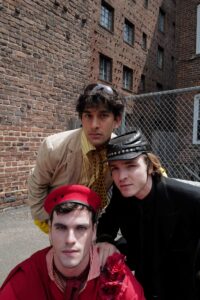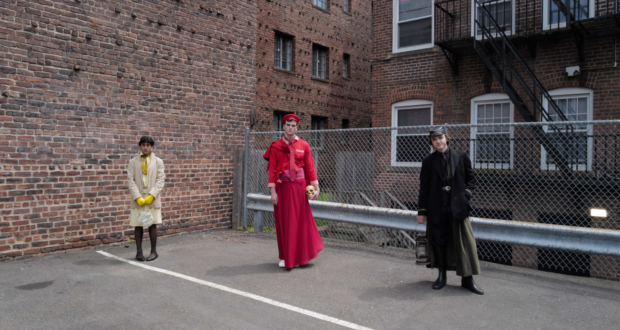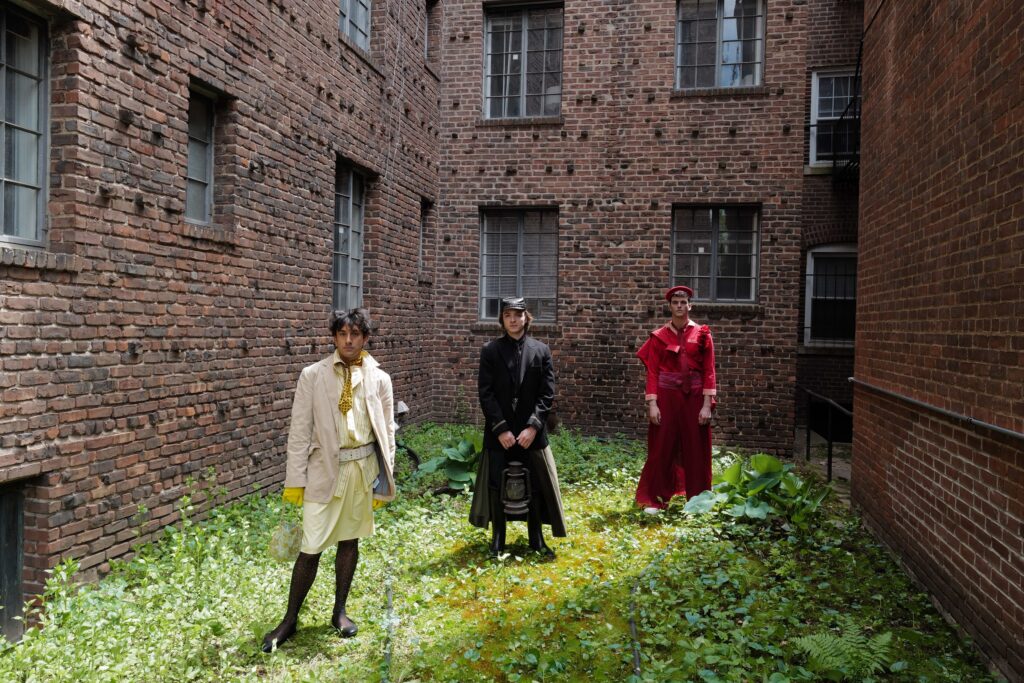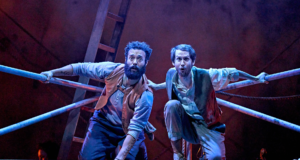Leo Egger and Dominic Sullivan on Dead Souls
Camden Fringe always has a way of attracting unexpected visitors. And this year is no exception, with artists coming from all corners. Quite possibly the furthest to come are Leo Egger and Dominic Sullivan, who are travelling from Durham – North Carolina, not the one a little north of London! A whopping 6,250 miles, give or take.
Always keen to show our support for those making such an effort to get here, we reached out to Leo and Dominic to chat about their play Dead Souls. The play, newly translation by Illya Khodosh, and based on Mikhail Bulgakov‘s 1932 adaptation of Nikolia Gogol‘s classic novel, Dead Souls. And if they can journey over six thousand miles to bring you the play, we can surely travel a few to go and see it when it comes to Etcetera Theatre in August?
What can you tell us about Dead Souls?
Leo: Dead Souls is a 1842 comic masterpiece written by Nikolai Gogol, the oddball genius of early Russian literature. The Moscow Arts Theater (founded by the great Konstantin Stanislavsky) attempted upwards of 160 adaptations of the novel, all of which fell short, until the job was assigned to Bulgakov. Shortly before he wrote that play, Bulgakov sent a pleading letter to Stalin requesting that he be allowed to emigrate from Russia, but was instead assigned a position as an “Assistant Director” at the Moscow Arts Theater. When assigned to write the adaptation, Bulgakov despaired, not only because he felt writing stage adaptations was below his literary capacities but also because he felt that Dead Souls is simply unstageable. Yet, Bulgakov found a way through the story by linking his own feeling of being misunderstood to that of Gogol, who was a kind of spiritual mentor to him. The play actually begins in Rome, where Gogol wrote Dead Souls. The show is as much about the writer’s journey and the desire to be understood by the readers/audiences of the future as it is about Chichikov’s escapade.
Dominic: There is so much to say – as Leo has outlined – in terms of the development of the play; but in terms of the story, the play, and our adaptation, it is, in a word, absurd. Dead Souls follows a man attempting to rise through the ranks of a corrupt Russia in a highly satirical comedy. And the play itself has basically been in hibernation for the past 90 years, so we have a strong focus on its relatability today, seeking to find Dead Souls’ place in the now.
How did you come to Mikhail Bulgakov’s work?
Dominic: This is a cool story. So, Leo and I took a class together at Yale called “Stanislavsky: His Rebellious Protégés (and some Americans)” with arguably the greatest professor of Russian theatre in America, David Chambers. The class inspired us hugely to explore more and more in the realm of Russian theatre. The class exposed us to the history and techniques of theatre in Russia, and also the influences it had and continues to have on Western theatre. We had just worked together on a production of Gogol’s The Government Inspector (Leo directing and myself as Producer), so we were inspired after that to do some more absurdist Russian comedy.
Leo and I were looking into some stories that we could adapt — or rather, he could adapt whilst I said, “Good job, dude. Keep it up!” — and also asked David if he had any thoughts or ideas. Our initial idea was to create an adaptation of The Nose. But David came back with a translation by Ilya Khodosh of the original script of Dead Souls, which we were kindly allowed to use for free by Ilya.
Leo: I first came to know Bulgakov’s work through his marvelous novel Master and Margarita, which features Satan, Judas, and a huge demonic cat with a handgun, among other things. Bulgakov relishes in the strange and the fantastic, which I find inspiring, both in life and on the stage. When I had the chance to work with one of his shows (with the added benefit of being connected to Gogol, another literary hero of mine) I just had to go for it.
Is an obscure 1932 Russian play still relevant for a modern audience?
Leo: Yes. This show is a (deeply hilarious) satire about a seedy con man, his grotesque victims, and the suffering wrought from greed. Sound familiar? It is also about how a great artist creates work from life and forges their own life through work.
Dominic: I would argue that now is the most important time to share this story, as we see the ongoing invasion of Ukraine and the inhumane treatment caused by high-society in Russia. The pursuit for power, ownership, respect, and status is current. Of course, it wasn’t originally written for now – the play is set over 150 years ago – but, again, the themes are still there. It serves as a reminder of the current raging war.
 Do you feel a play about Imperial Russian aristocracy will be viewed differently between America and Britain given we’re a monarchy?
Do you feel a play about Imperial Russian aristocracy will be viewed differently between America and Britain given we’re a monarchy?
Dominic: This is actually a really interesting question – so, thank you for that. Dead Souls serves as an exposé of the corruption of mankind, the desire to attain high-status and the greed to earn more respect. Of course, respect is not a bad thing. I respect so many people who aren’t part of high-society. But the pursuit of respect that occurs in Dead Souls is fraudulent. (I don’t want to spoil the plot of the play, however, there is always a way to get out of trouble in a corrupt society.)
Leo: The show is about unfettered capitalism, not monarchy, which runs amok in both Britain and America, so I think the experience will be rather similar for audiences.
Dominic: There is a very large and strong argument that the monarchy should not be respected just because of their birthright. Respect is earned through hard-work, demonstrations of generosity and/or when one is exemplary. Thus, there might be ties drawn from this play and the monarchy in Britain. But we aren’t attempting to use it as a political statement against the monarchy.
You have three actors playing over 30 roles, does it get as madcap as that sounds?
Dominic: I’ll tell you what it is, it is pure joy (and crazy). All the characters are unique and specific, and that quest for specificity is what is most enjoyable, I think anyway – I’m sure it’s a headache for Leo. We do have one actor (Nico Taylor) who plays the lead character, Chichikov, throughout the whole play – which was chosen to provide an element of stability and familiarity for the audience – so, in reality Hamzah Jhaveri and I are basically playing all of the other characters. And also, we both play the same characters quite often, so we each provide our own perspective and characterisation on the roles. It’s not a competitive comparison of who does the better rendition of the Chairman or whomever, but rather, an emphasis on the universality of these people. Hamzah and my interpretations are informed differently as a result of our life experiences and identity, and that is what makes it exciting. That all being said, it is hard, and it is tough to keep up. But that’s what rehearsal is for, no?
What brings a theatre company from North Carolina all the way to Camden Fringe then?
Dominic: So this is a collaboration between the Eno River Players and the Yale Bookends, a theatre group that has performed at the Camden Fringe before. Last year, the Yale Bookends performed an adaptation of Plato’s dialogues about Socrates’ trial and death – the play was called Phaedo. The texts are inherently theatrical but are never set in a theatrical context, so the Yale Bookends did just that. Leo founded the Eno River Players about six years ago, staging plays such as King Lear, Hamlet, and As You Like It, in Durham, North Carolina, but also directed Phaedo in London last summer. And we had discussed doing a show in Durham, as well as bring it to New York, and said, “Why not go back to London?” So, that’s what we’re doing, and we can’t wait!
And as you’re traveling all that way, do you have any other plans whilst you are in London?
Leo: I hope to drink a few pints with friends, see a few fringe shows, see some shows on the West End and go to Nandos.
Dominic: Me too, I love Nandos…
Many thanks to Dominic and Leo for the chat. You can catch Dead Souls when it plays Etcetera Theatre 3, 4, 5 and 7 August as part of Camden Fringe. More information and bookings can be found here.
 Everything Theatre Reviews, interviews and news for theatre lovers, London and beyond
Everything Theatre Reviews, interviews and news for theatre lovers, London and beyond




